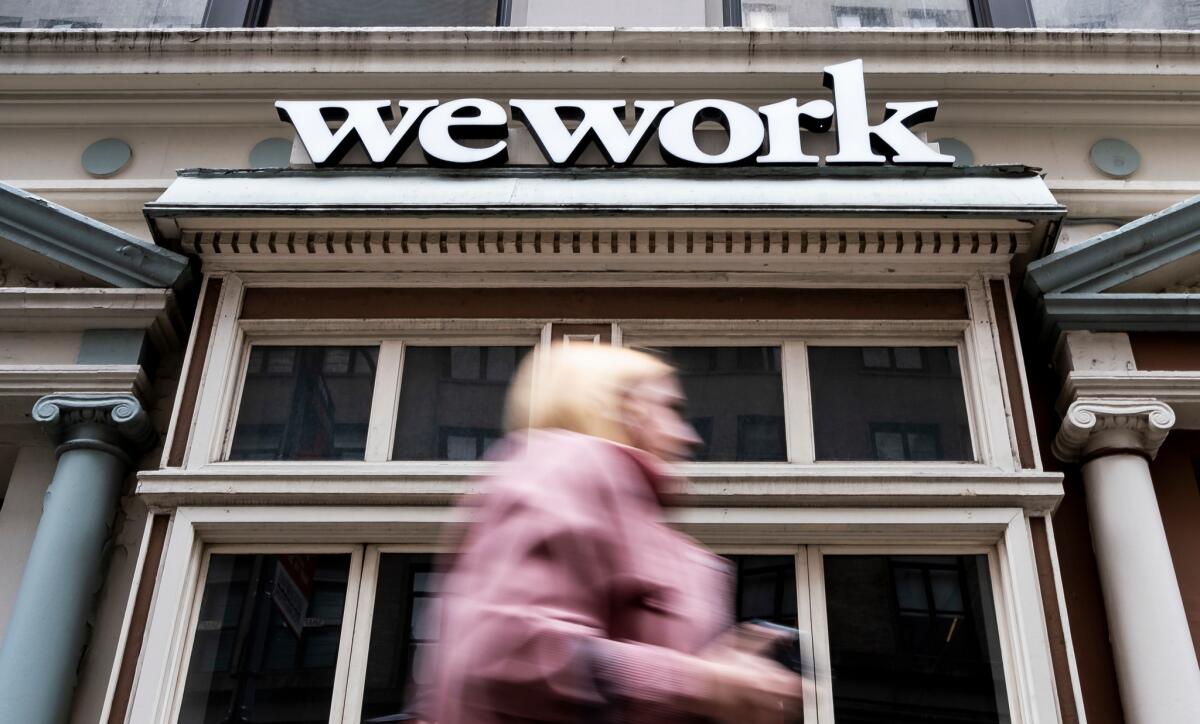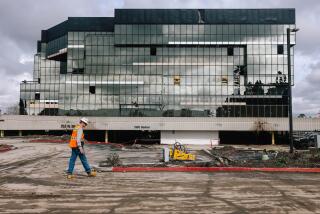WeWork is all about community. Will social distancing crash its business model?

It was the hot idea out of the last financial crisis: Save money on office costs by bringing strangers together in hip, well-appointed communal working spaces. But can WeWork and other providers of shared office space survive social distancing?
WeWork and its kind are reeling as the COVID-19 pandemic drives away their customers and challenges the future viability of their shoulder-to-shoulder business model.
New York-based WeWork, the biggest provider of co-working space, missed April rent payments to some of its landlords and has had to close some of its offices temporarily to clean up after they were exposed to the novel coronavirus. Other co-working space providers have simply shut down, at least until the end of the crisis.
WeWork, which has faced a host of financial problems in the last year, including a botched initial public offering, has drawn up a post-pandemic plan that emphasizes open space, a potentially income-sapping move that may not be enough to soothe apprehensive tenants.
Co-working providers flourished on the heels of the Great Recession by providing many people who had been laid off with a place to work as independent contractors, start fresh ventures and perhaps make new contacts in a convivial environment.
The concept proved so popular that larger companies that typically established their own offices began to rent furnished co-working, or “flex” space, as it became known, as a way to open outposts in new cities or house overflow from their existing offices. The month-to-month lease terms were appealing for quick expansions and contractions.
But WeWork and other co-working companies subletting that space to their members were themselves committed to long-term leases with the building owners. Now co-working firms’ incomes are plunging while their major expenses remain fixed.
“The idea was to rent more square footage than they were actually leasing and play that arbitrage,” said Christopher Rising of Rising Realty Partners, a Los Angeles-based landlord who has WeWork as a tenant in one of his office buildings.
WeWork has said that it is working with its more than 600 landlords to try to secure rent concessions, and Bloomberg reported that it is in discussions with its biggest landlords in an effort to slash as much as 30% from its substantial load of future rent liabilities, which stood at $47 billion as of June 30.
Rising said that he was one of WeWork’s landlords who didn’t receive its April rent and that he was unable to reach the company before rent was due to discuss payment options for space WeWork leases in downtown Denver.
“They don’t communicate, they don’t respond, there is nobody home,” Rising said. “No one is minding the shop.”
If WeWork defaults on its lease, he said, Rising’s company can potentially collect millions of dollars in collateral that WeWork put up in a letter of credit before moving in.
WeWork has been offering some tenants rent discounts to minimize cancellations amid government-mandated stay-at-home orders that have forced many nonessential employees to telecommute. (WeWork facilities remain open because they serve essential workers in businesses that include housing construction, scientific research and payroll services, company spokeswoman Ingrid Thorlaksson said.)
In late March, WeWork offered West Hollywood event planning firm Martin & Vanegas Agency discounted rent for the coming months. But the firm’s executives wanted out of the offices in the Pacific Design Center after WeWork temporarily shut down two floors for a disinfection after a tenant’s employee tested positive for COVID-19.
WeWork’s employees are working from home, agency co-founder Kevin Vanegas complained, but WeWork expected him to keep paying rent even after the office had been exposed to the virus on two occasions in March and April, as emails from WeWork to tenants show.
“I am furious,” Vanegas said. “I’m afraid to even go in and move our belongings out.”
There have been fewer than 10 instances of WeWork offices being closed for cleanups after coronavirus exposures, Thorlaksson said.
WeWork opened its first Southern California office in 2012 in Hollywood. It now leases about 2.5 million square feet in Los Angeles County, according to real estate brokerage JLL.
Despite the failed IPO and the ouster of Adam Neumann last year, WeWork’s reach is wide and still expanding.
The company recently opened an office in Woodland Hills and plans spring openings in downtown Glendale and at showbiz-centric Lantana Center in Santa Monica. A Beverly Hills branch is set to open this summer in the former headquarters of talent representative Creative Artists Agency.
WeWork also provides 150 desks in four locations for people who work for the government of Los Angeles County as part of a pilot program to let county employees perform some tasks closer to their homes.
“L.A. is high priority” for WeWork, general manager for California Elton Kwok said in an interview early last month, before stay-at-home orders became the norm. “Companies want to be in L.A. and we are at the forefront of that charge.”
For the time being, some co-working companies such as Convene have suspended operations or reduced the number of open offices. Others, including Knotel, have laid off staff and are looking for ways to quickly shed underperforming offices by cutting deals with their landlords.
The Wing, a co-working provider for women, announced this month that it would close its branches, including one in West Hollywood, and lay off or furlough employees, with the hope of reopening in the future.
“While our hearts are broken, we are not giving up,” Wing management said in a statement.
Los Angeles has one of the highest concentrations of co-working spaces in the country, with providers renting a total of 5.3 million square feet, or about 2.8% of total office inventory, according to JLL. The bulk of it is on the Westside and in downtown Los Angeles.
Reports from brokers and tenants suggest that occupancy in co-working offices has fallen dramatically since the crisis as tenants such as Venagas opt to work from home and give notice or withhold rent payments.
WeWork has announced plans for how offices will be set up after the pandemic, with more space between desks and layouts that make it easier for members to move around without being too close to one another. More space could translate into fewer tenants per location, which would cost WeWork rental income.
But an even bigger problem: Many people are likely to consider proximity to other people risky in the future, said Stuart Gabriel, director of the UCLA Ziman Center for Real Estate.
“We are going to carry the trauma of this virus risk with us for some time,” Gabriel said. People will avoid “anything that has the word ‘co’ in front of it — co-working, co-living.”
With WeWork’s occupancy and revenues in decline, Gabriel said he is “very concerned” about the company’s ability to pay its debts over the next four quarters.
A sustained economic contraction could pose a substantial threat to co-working providers because the start-ups that flock to them might fold at a greater rate as funding and demand for their products dry up. Bigger companies that use flex space for supplemental offices also might contract.
WeWork patron SoftBank, which saved WeWork from bankruptcy last year, recently decided not to buy back $3 billion in WeWork stock from other shareholders, and Chief Executive Sandeep Mathrani told the already reduced staff Tuesday to expect more layoffs by the end of May.
WeWork said in a statement that the company is on track to turn an adjusted profit “in the near term” and that it has “a new business pipeline” of more than $2 billion since February. “WeWork has the liquidity to navigate the challenges COVID-19 presents,” the company said.
Although a shakeout in the industry is evidently underway, plenty of real estate analysts say co-working has established its appeal to both small entrepreneurs and large companies and will survive in some form after the pandemic.
Co-working’s fundamental appeal is a re-creation of the best aspects of a private office environment, including human connection among like-minded peers, that can’t be found at home.
“I don’t think it’s going away,” Rising said of co-working. “We love our families, but we don’t want to be there 24/7.”
More to Read
Inside the business of entertainment
The Wide Shot brings you news, analysis and insights on everything from streaming wars to production — and what it all means for the future.
You may occasionally receive promotional content from the Los Angeles Times.











